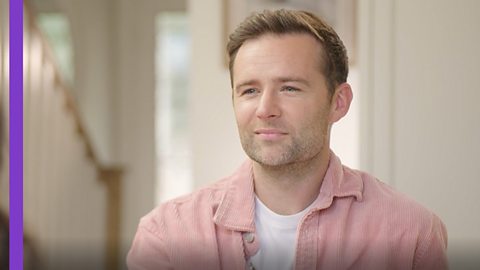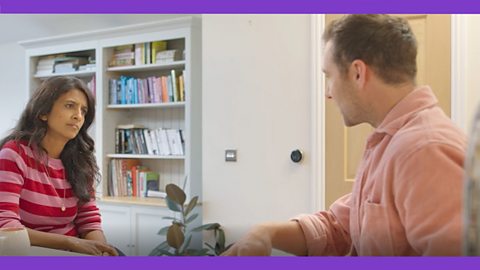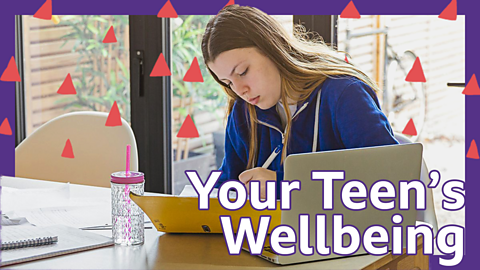The theme of this year's Anti-Bullying Week, 'Reach Out', is about encouraging children, teachers and parents to speak up and talk to each other about bullying, in all its forms. However, this conversation, particularly between parents and children, can often be difficult.
In this film, star parents Konnie Huq and Harry Judd discuss the complexities of speaking up about bullying.
Keep reading for some expert advice on how to encourage your child to reach out…
Presenter Konnie Huq and McFly's Harry Judd discuss their experiences of bullying in school and as parents
Harry (00:00:00:00):So I knew if I told my mum, I think it would just tip me over the edge.
Intro
Konnie (00:00:07:07):I do remember this incident actually, primary school, where this kid, I even remember his name. And I remember him pointing at me and, “ha ha, she’s from India.” And I remember going, “No, I am not!” And thinking, well I’m not lying because actually, I’m from Bangladesh. But really, I was saying it because I had wanted to be like everyone else and fit in, and I said, “no, I’m not from India”because that’s obviously derogatory, like having curly hair, or whatever it isa bully picks on, they’re saying it in a way, where they’re trying to make you feel ashamed of who you are, and what you are.
Harry (00:00:37:08):Who you are, yeah.It is a tough environment. I kind of, went through a whole year of that.But yeah it’s interesting, it was never physical, it was never verbal,I was just shunned from the group. I was just ignored,
Konnie (00:00:49:20):But that in itself is…
Harry (00:00:51:11):Brutal.
Konnie (00:00:51:22):…really, really hard.
Harry (00:00:52:05):Absolutely brutal, yeah.
Konnie (00:00:53:19):So when you were having a hard time at school, did you feel there was anyone that you could talk to about it?
Harry (00:00:58:23):Yeah, there were a couple of friends that weren’t in that group of people,That I talked to about it. Yeah, that definitely helped.I didn’t talk to my parents or family about it because I think, you’re embarrassed.
Konnie (00:01:12:11):Totally.
Harry (00:01:12:22):I had always been in that group, and popular and stuff, and then suddenly, being excluded was like, the shame of it, you know?And also, I knew if I told my mum, I think it would just tip me over the edge.
Konnie: (00:01:23:03)And talking is a really therapeutic outlet. So, encouraging your kids to talk about things and get things off their chest, is so important because when things arebottled up, that’s when it can get to the tipping point.
Harry (00:01:35:20):Certainly, trying to get stuff out of your children can be hard at the best of times,so it’s really about picking your moments as well. Yeah, you could be going on a drive, or a walk with them but I find actually, nighttime is quite a good one.You start filling a story, about to go to sleep. Just chat to them about their day.
Konnie (00:01:50:00):So obviously, my children are a bit older than your children, so secondary school is on the horizon. That’s when you had your tough time. Is there any approach or any tips that you could give me?
Harry (00:02:02:00):When kids are getting older, I think it’s how you talk to them, feel respectful to them, in the way that you are around the house. They’re more likely to engage in a conversation. I think you need to get on a level where you can really communicate with them and start treating them like young adults.
Konnie (00:02:20:11):And I think, you know, encouraging different interests in your child and findingwhat they like and what makes them happy, can sort of, empower them.
Harry (00:02:28:23):Definitely, yeah.
Konnie (00:02:29:13):And that’s quite important.
Harry (00:02:31:12):Yeah, it can give them that sense of belonging and identity, and I definitely think sport or whether it’s a hobby, anything.
Konnie (00:02:38:05):An interest that they feel passionate about.
Harry (00:02:40:09):Because I started doing well at sport, I suddenly just started to get respect through that, and I kind of, got let back in. And these guys I’m talking about are still my best friends. And sport is, kind of very mindful, you’re in the moment.You’re not focused and constantly thinking about the negative things going on in your life.
Learning that your child is being bullied can be incredibly distressing. However, through calm and supportive conversation, you can equip your child with the tools they need to open up, reach out and understand that they're not alone during these tough moments.
Parents' Toolkit spoke to Martha Evans, Director at Anti-Bullying Alliance, who gave some top tips to help you help your child reach out about bullying…
1. Pick the right time for a conversation
It can be quite intense to suddenly start a conversation about bullying with your child. Often children will want to run in the opposite direction. Make the conversation natural. A great tip is to bring up the topic when watching a movie or reading a book.
For example, Harry Potter has lots of themes around bullying. You can discuss the characters and their actions, why they are wrong or how it made another character feel. This is a less intense way into the conversation and it can help your child open up.
2. Remain calm and listen carefully
It can be really upsetting to hear your child is being bullied and you might want to take it into your own hands straight away. However, it takes a lot for children to reveal that they are being bullied and in the first instance they often just want to be heard.
Make sure to listen carefully and try to establish what has happened, where and when the bullying took place, who was involved and how long it has been going on for.
3. Remind them they are worthy
Bullying can really knock children’s confidence and cause poor wellbeing. If your child reveals that they are being bullied, remind them that they are worthy and let them know that the bullying is not their fault and they do not deserve it. Replace what they may have been called or told by their bully with encouraging words of affirmation.
4. Discuss different courses of action
Come up with different ways they can reach out and help them choose the best method. You could discuss the school’s anti-bullying policy and ask if they feel comfortable for you to talk to the school. Or you could find out if they have a particular teacher at school that they feel comfortable talking to. If they aren’t ready to tell a teacher, do they have any friends that they can confide in?
Sometimes, children may not be comfortable discussing it at school in the first instance. There may be local youth groups or charities they can access, or they can have a look at resources online. It’s important that they feel involved with the next steps so discuss all the options with your child.
5. Take it slow
Encouraging children to reach out is a process that may take some time, so do it at their pace. Sharing the positives of reaching out can help them want to do it themselves. It’s also important for parents to take it slow and look after themselves. It can be an emotional time and parents often blame themselves for not protecting their children properly. Remember, it’s not your fault and take some time to practice self-care.
6. Model positive behaviour
Setting examples of positive actions and words at home can help children understand what is and isn’t acceptable behaviour. Encourage each other to talk and build empathy. Perhaps everyone can share what happened in their day at tea time, whether it was good or bad. We all have a role to play in creating kind and supportive communities and it’s great to begin that at home.
For more information about Cyberbullying, head over to
C91»»±¨ have made some animations on the things your child can control around bullying - they're here on 91»»±¨ iPlayer.
Martha Evans is Director of the
Anti-Bullying Week takes place from the 13 to 17 November and is organised by…
in England and Wales
in Scotland
in Northern Ireland

More from 91»»±¨ Bitesize Parents' Toolkit‚Ķ
Parents' Toolkit
Fun activities, real-life stories, wellbeing support and loads of helpful advice - we're here for you and your child.

Where does bullying happen and how can you tackle it?
Conversation with star parents Harry Judd and Konnie Huq, as well as expert advice to help you understand where bullying happens.

What are the signs of bullying?
Harry and Konnie discuss the signs of bullying, with tips on how to spot them from the Anti-Bullying Alliance.



